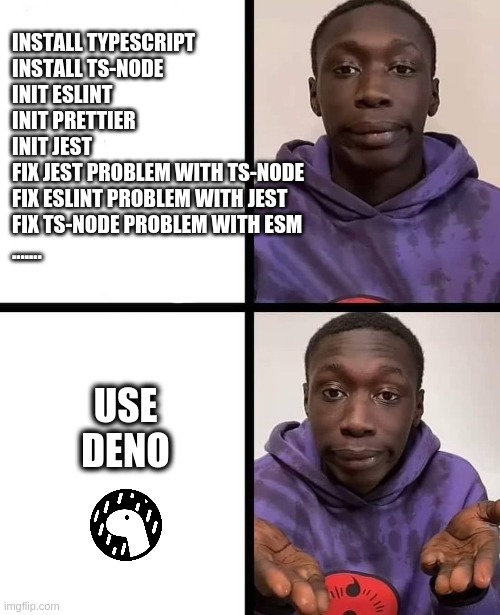tsc replacement for transpiling Deno libraries to run on Node.js.
Note
You don't need this if you maintain a npm package Deno can already run: https://deno.land/manual/node
Run npx deno2node --init in an empty directory.
Note
If you don't already have a package.json, you may find dnt
easier to use.
npm install -ED deno2node
npm pkg set scripts.prepare=deno2nodeWarning
New features or TypeScript upgrades may change output or diagnostics
across minor versions of deno2node. Use --save-prefix='~' or
--save-exact (-E) to avoid unexpected failures.
Create a tsconfig.json to specify "compilerOptions" and "files" to
"include", if you don't have one already.
You can now invoke deno2node by running npm run prepare.
It will alse be executed automatically when you run npm install.
deno2node is actually a Deno project that compiles itself to run on Node.js.
(This is a great way to test the tool, too.)
deno run --no-prompt --allow-read=. --allow-write=. \
https://deno.land/x/deno2node/src/cli.tsThere are three main steps to this.
- Transform the code base in-memory, by rewriting all import statements.
- Typecheck the code.
- Emit
.jsand.d.tsfiles. These files can directly be run by Node or published on npm.
deno2node uses ts-morph under the hood, which in turn builds on top of the
TypeScript compiler tsc. Hence, you get the same behaviour as if you had
developed your code directly for Node.
deno2node can perform more powerful transpilation steps that make it flexible
enough for most needs.
Some things are global in Deno, but not in Node.js.
To rectify this, create a file that exports shims for the globals you need:
// @filename: src/shim.node.ts
export { webcrypto as crypto } from "crypto";
export { Deno } from "@deno/shim-deno";
export { alert, confirm, prompt } from "@deno/shim-prompts";Note
node: APIs are well-supported on both runtimes.
Then, register your shims in tsconfig.json, so deno2node can import them
where needed:
// @filename: tsconfig.json
{
"deno2node": {
"shim": "src/shim.node.ts" // path to shim file, relative to tsconfig
}
}In same cases you may want to have two different implementations, depending on
whether you're running on Deno or on Node. When shimming is not enough, you can
provide a Node-specific <anything>.node.ts and a Deno-specific
<anything>.deno.ts version of any file. They need to reside next to each other
in the same directory.
deno2node will ignore the Deno version and rewrite imports to use the Node.js
version instead. Thus, the Deno-specific file will not be part of the build
output.
For example, provide greet.deno.ts for Deno:
// @filename: src/greet.deno.ts
export function greet() {
console.log("Hello Deno!");
// access Deno-specific APIs here
}Now, provide greet.node.ts for Node:
// @filename: src/greet.node.ts
export function greet() {
console.log("Hello Node!");
// access Node-specific APIs here
}Finally, use it in foo.ts:
import { greet } from "./platform.deno.ts";
// Prints "Hello Deno!" on Deno,
// and "Hello Node!" on Node:
greet();This technique has many uses. deno2node itself uses it to import from
https://deno.land/x. The Telegram bot framework grammY uses it to abstract
away platform-specific APIs.
To import a module which has no npm equivalent, first set up vendorDir.
// @filename: tsconfig.json
{
"deno2node": {
"vendorDir": "src/vendor/" // path within `rootDir`
}
}Then, populate it: deno vendor src/deps.vendor.ts --output src/vendor/.
Vendoring is still experimental, so be welcome to open an issue if you encounter a problem with it!
Also, consider recommending pnpm to users of your library. It might be able
to deduplicate vendored files across packages.
Confer the automatically generated API Reference if you want to use
deno2node from code.
Register tests via "node:test", and build them alongside the source.
Then, test with deno test src/ and node --test lib/.
npm it to install dependencies, build, and test the project.
git config core.hooksPath scripts/hooks/ to build before each commit.
